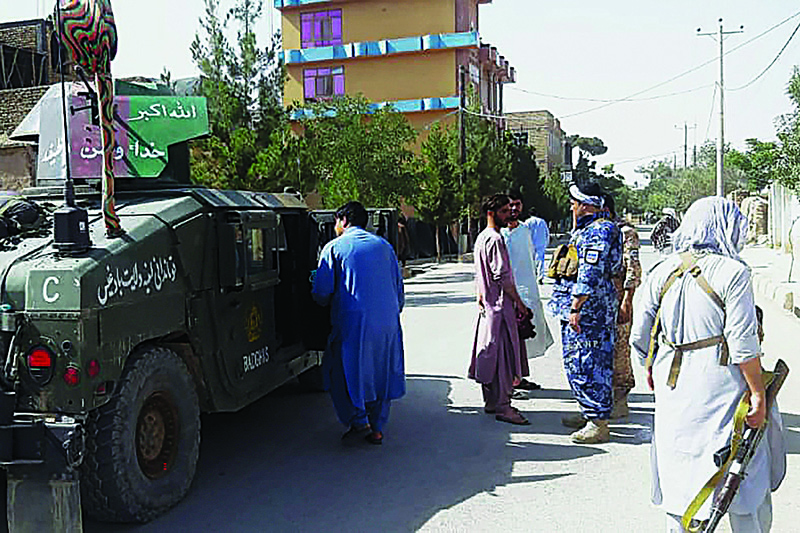 QALA -I -NAW, Afghanistan: Afghan security personnel stand guard along a road amid ongoing fight between Afghan security forces and Taleban fighters in the western city of Qala-i- Naw. - AFP
QALA -I -NAW, Afghanistan: Afghan security personnel stand guard along a road amid ongoing fight between Afghan security forces and Taleban fighters in the western city of Qala-i- Naw. - AFPHERAT, Afghanistan: Plumes of smoke billowed over an Afghan provincial capital yesterday as fighting raged between the Taleban and government forces for a second straight day. The government flew hundreds of commandos into Qala-i-Naw, in northwestern Badghis province, the first regional capital to face an all-out assault by the Taleban since the United States stepped up its troop withdrawal.
With the US pullout "90 percent complete", according to the Pentagon, the insurgents have launched a blistering campaign to capture new territory, and fears are mounting that Afghan forces will collapse without vital American air support. President Ashraf Ghani said the government had the capacity to handle the situation, but admitted the difficulties ahead. "What we are witnessing is one of the most complicated stages of the transition," he said in a speech in Kabul. "Legitimacy is ours; God is with us." In London, Prime Minister Boris Johnson said most British troops had now left Afghanistan as part of a NATO withdrawal in parallel to the US pullout.
"I will not disclose the timetable of our departure, but I can tell the House that most of our personnel have already left," he said in a statement to MPs yesterday. US President Joe Biden was due to speak on the US pullout later in the day after meeting his national security team. The withdrawals have drastically emboldened the Taleban, and video obtained by AFP showed thick smoke billowing over Qala-i-Naw yesterday, soundtracked by gunfire, as fighting raged. Badghis health official Abdul Latif Rostaee said at least 10 civilians had been taken to hospital since the fighting erupted.
"The Taleban have resumed their attacks from several directions with light and heavy weapons," Badghis Governor Hessamuddin Shams told AFP yesterday. "Our security forces are bravely fighting them and the enemy is being pushed back. They are fleeing. We will give a hard blow to the enemy." On Wednesday, the Taleban briefly seized the police headquarters and the local office of the country's spy agency, but were later pushed back. Qala-i-Naw resident Aziz Tawakoli said Taleban fighters were still roaming the city, however. "You can see them going up and down the streets on their motorcycles," he said.
Tawakoli said many of the city's 75,000 people had fled their homes-either to nearby districts or to neighboring Herat province. "The shops are closed and there is hardly anyone on the streets," he said, adding that helicopters and planes had bombed Taleban targets through the night. Badghis provincial council member Zia Gul Habibi said the Taleban suffered casualties, but also surrounded the city. "All districts are under their control... People are really in fear," she said. "All shops and government institutions are closed. There are still reports of sporadic fighting."
'Women will not be able to work'
Parisila Herawai, a rights activist in the city, expressed concern for the safety of women in particular. "It is an emergency situation for all women, especially activists," she told AFP. "If the Taleban plan to remain in the city, we will not be able to work." Local officials said some security officers had surrendered to the Taleban, and the insurgents opened the gates of the city jail, freeing hundreds of prisoners. Most had since been recaptured, officials said. Overnight, the defence ministry rushed hundreds of commandos to the city to launch a "large scale operation", spokesman Fawad Aman said on Twitter.
The attack on Qala-i-Naw comes as the Taleban carry out a blistering campaign across the country but mostly in the north, capturing dozens of districts since early May. The fighting appeared to be spreading in Herat, where officials acknowledged losing two districts to the insurgents. Rights group Human Rights Watch said the insurgents were forcing people from their houses in northern areas that they had captured. "The Taleban's retaliatory attacks against civilians deemed to have supported the government are an ominous warning about the risk of future atrocities," said HRW associate director Patricia Gossman.
"The Taleban leadership has the power to stop these abuses by their forces but haven't shown that they are willing to do so." Meanwhile a meeting between an Afghan government delegation and Taleban representatives in Tehran ended yesterday, Iran's state news agency said, with both sides urging an end to fighting, and more talks. Official talks between the government and Taleban in Doha have largely fizzled out after months of deadlock. - AFP









